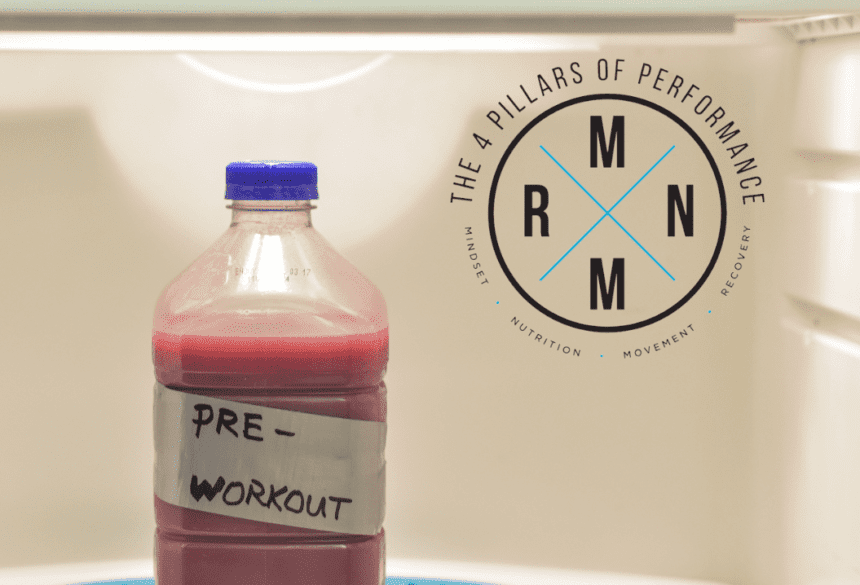Exos nutrition principles are simple: there’s a right time to fuel your workout, and a right mix of nutrients your body needs to perform at its best. Recovery is essential for muscles as we ask them to do hard work and get stronger, and without the right fuel, recovery takes longer. So, let’s break down a nutrition-as-workout-fuel plan that includes before, during, and after activity tips for recovery nutrition.
Remember that fuel for your body should be a combination of carbohydrates to fuel, protein to build, and fluids to hydrate. Here are a few quick guidelines on how (and when) to fuel for performance.
What should I eat pre-workout? When should I fuel before a workout?
To perform your best your body needs fuel. Eating a combination of mostly carbohydrates and a little protein before a workout will help to keep energy levels high and start muscle recovery faster.
Pre-Workout Snack (30 minutes to 2 hours before you work out)
- 15-30 grams carbohydrates
- 5-15 grams lean protein
- 16-20 ounces of water
Snack Options (regular serving sizes unless otherwise noted)
- Half of a turkey or PB&J sandwich
- Greek yogurt with fruit or honey
- ½ cup cooked oatmeal with peanut butter
- 1 slice whole grain toast and a hard-boiled egg
- Cereal with a banana
Going into an activity properly fueled will help improve performance and jumpstart recovery.
What should I drink during my workout?
Hydration during a workout is all about keeping electrolytes and fuel stores balanced. Failing to hydrate before, during, and after workouts can lead to decreased muscle function, GI distress, increased heart rate, decreased ability to cool the body, and general lack of energy. A properly hydrated body has an increased blood volume that helps transport oxygen and nutrients to our working muscles.
Hydrate During a Workout
- 4-6 drinks of fluid every 15 minutes (about 20-32 ounces an hour)
- Water for short or less-intense workouts
- Sports drinks with at least 110 milligrams of sodium per 8 ounces for high-intensity or longer workouts (longer than an hour)
For prolonged exercise, carbohydrates enhance performance by providing energy and maintaining blood glucose. 30-60 grams of carbs/hour is recommended to replace fuel stores lost during prolonged/intense activity. (Coach note: feel free to give audience example of what this may look like from food or beverage)
How do you know if you’re hydrated? Check out the color of your urine!
What should I eat after a workout?
Post-workout fuel increases blood insulin. Insulin is actually an anabolic hormone that helps change your body into a building state by decreasing stress hormones (catabolic hormones, like cortisol), inhibiting muscle breakdown, and aiding in glycogenesis (process of glycogen synthesis).
Post-workout nutrition should help restore muscle and liver glycogen, decreases muscle breakdown, and help stimulate protein synthesis. This can be done with the right combination, amounts, and timing of nutrient consumption.
Have questions about supplements? Check out this guide to the most popular ones.
Post-Workout Fuel for Recovery
- 15-91 grams of carbohydrates (depending on current weight and needs: less for weight loss, more for intense training or larger body mass)
- 20-30 grams of quality protein (try whey protein for quick absorption)
- 20 ounces of fluid for each pound of weight lost during the workout
Post-Workout Fuel Options (all with water)
- Turkey or meat sandwich
- Eggs with toast and fruit
- Oatmeal with milk and nuts
- Smoothie with Greek yogurt or whey protein isolate
- Meal replacement shake (for on the go, using whey protein or vegan protein)
- Next scheduled meal or snack
Situation-specific exceptions to these guidelines
All these recommendations are given in ranges because every person’s body has different needs. You may need more or less of these nutrients depending on age, medical conditions or injury, workout intensity, body weight and muscle density, and fitness and health goals.
Timing of your pre-workout and post-workout snacks or meals is also depending on what the rest of your fueling schedule looks like, and whether you’re meeting all your calorie, macronutrient, and fluid needs consistently.
Check with your doctor and your personal trainer to learn more about how to fine-tune your pre- and post-workout fueling plan to optimize performance and stay healthy!


